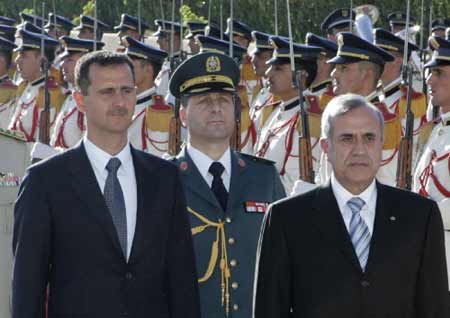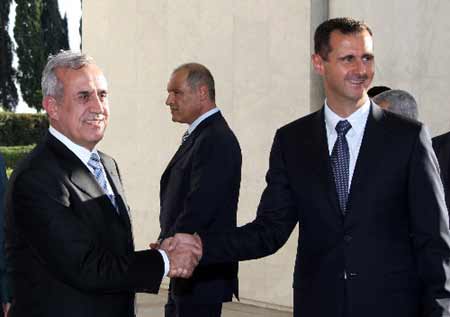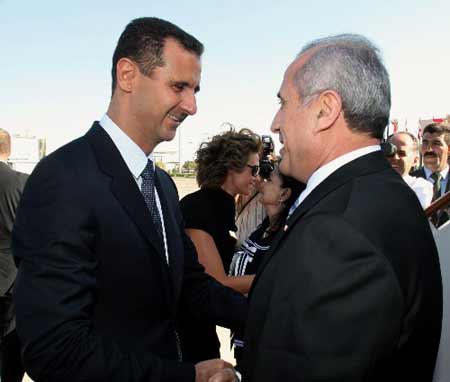Lebanese President Michel Suleiman arrived in Damascus on Wednesday for a groundbreaking visit to Syria.
Syrian President Bashar al-Assad and his wife received their Lebanese counterparts at the Damascus International Airport, according to the official SANA news agency.
This is Suleiman's first visit to Syria after he took the presidency and also the first by a Lebanese president to Damascus since March 2005 when then Lebanese President Emile Lahoud came here.
Suleiman told the Lebanese newspaper As-Safir on Wednesday that his visit to Syria, in response to an invitation of Assad, is a "turning point" to restore the situations to the normal position between the two sisterly countries, according to SANA.
Suleiman also described his relations with Assad as "fraternal and distinguished", saying preparations for the visit from both sides are "positive and good".
During his two-day stay here, Suleiman will discuss with the Syrian senior officials "issues of common interest and the latest developments on the regional and international levels," said SANA.
The establishment of diplomatic ties and the opening of embassies were expected to top the agenda of the meeting between Suleiman and Assad, analysts said.
Last month, Assad and Suleiman announced in Paris after a meeting with French President Nicolas Sarkozy that they agreed to establish diplomatic ties and open embassies in each other's territory.
Syria and Lebanon have not established diplomatic relations since their independence from the French colonial rule in the 1940s.
Meanwhile, the demarcation of borders between Lebanon and Syria, and the Lebanese detainees and missing persons in Syria were also expected to be discussed during Suleiman's visit.
The fate of the Syrian-Lebanese Higher Council formed in 1991 was another topic expected on the agenda.
 |
|
Syria's President Bashar al-Assad (L) and his visiting Lebanese counterpart Michel Suleiman review an honour guard in Damascus August 13, 2008. |
President Suleiman was reported to have agreed on keeping the council functioning, however, he wants a "clear definition of the council's mission and task so that they do not overlap with Syrian and Lebanese ambassadors," according to the Lebanese Al-Liwa daily.
Bilateral ties between the two countries have been chilled since the assassination of former Lebanese Prime Minister Rafik Hariri in Feb. 2005, which was blamed on Damascus, but Syria denied any role.
Syria, a former power-broker in Lebanon, was forced to withdraw its forces from its smaller neighbor shortly after the killing, ending its three-decade military presence there.
Damascus was accused of interfering in the Lebanese affairs and responsible for a series of assassinations of anti-Syrian politicians in Lebanon afterwards, which Syria also denied.
Syria supports the Lebanese opposition in the parliament, led by the Shiite Hezbollah movement, which has been competing for power with the majority backed by the west.
The tensity of relations between Syria and Lebanon abated after rival Lebanese parties secured an agreement in Doha in May to elect Michel Suleiman as president and establish a new government. Damascus was deemed to have played a constructive role in reaching the agreement.
 |
|
Syrian President Bashar al-Assad (R) shakes hands with his visiting Lebanese counterpart Michel Sleiman during their meeting at the Al-Shaab Presidential Palace in Damascus August 13, 2008. (Xinhua/AFP Photo) |
 |
|
Syrian President Bashar al-Assad (L) shakes hands with his visiting Lebanese counterpart Michel Sleiman during their meeting at the Al-Shaab Presidential Palace in Damascus August 13, 2008. (Xinhua/AFP Photo) |
(Xinhua News Agency August 14, 2008)